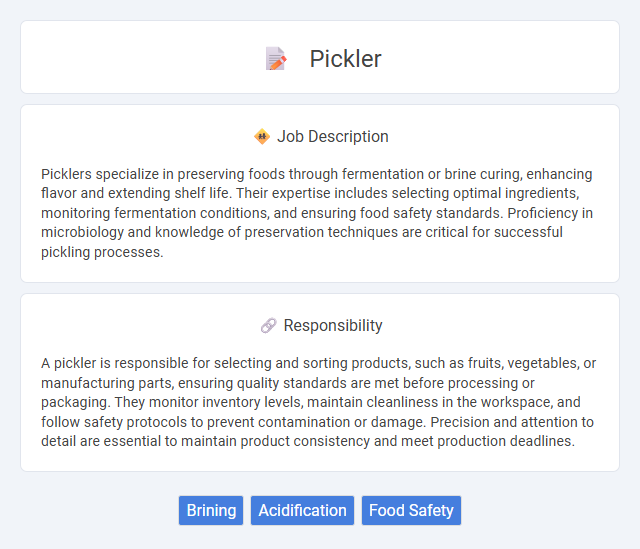
Picklers specialize in preserving foods through fermentation or brine curing, enhancing flavor and extending shelf life. Their expertise includes selecting optimal ingredients, monitoring fermentation conditions, and ensuring food safety standards. Proficiency in microbiology and knowledge of preservation techniques are critical for successful pickling processes.
People who are physically fit and able to work in cold, damp environments are likely to be suitable for a pickler job, as the role often involves handling salted or brined products. Candidates who tolerate repetitive tasks and possess attention to detail may have a higher probability of performing well. Those with sensitivities to strong odors or prolonged exposure to moisture might find this job less suitable.
Qualification
Picklers typically require a high school diploma or equivalent, with on-the-job training emphasizing food safety and sanitation standards critical for handling fresh produce. Experience in fast-paced environments and knowledge of proper pickling techniques, including brine preparation and fermentation processes, enhance job performance. Certifications in food handling and safety, such as ServSafe, are advantageous for advancing in the pickling industry.
Responsibility
A pickler is responsible for selecting and sorting products, such as fruits, vegetables, or manufacturing parts, ensuring quality standards are met before processing or packaging. They monitor inventory levels, maintain cleanliness in the workspace, and follow safety protocols to prevent contamination or damage. Precision and attention to detail are essential to maintain product consistency and meet production deadlines.
Benefit
A pickler job likely offers benefits such as steady income and opportunities for skill development in food processing. There is probable access to health insurance and worker benefits depending on the employer. The role may also provide a stable work environment with consistent demand in the agricultural and food production industries.
Challenge
The pickler job likely involves constant physical activity and repetitive motions, presenting a challenge to endurance and precision. Handling sharp tools and maintaining safety protocols may increase the risk of minor injuries, requiring careful attention and training. The fast-paced environment could demand quick decision-making and adaptability to ensure efficiency and quality.
Career Advancement
Picklers play a crucial role in food processing, specializing in the preservation of vegetables through fermentation and pickling techniques. Career advancement in this field often involves gaining expertise in quality control, food safety standards, and production management. Skilled picklers can progress to supervisory positions, product development, or operations management within food manufacturing companies.
Key Terms
Brining
Picklers play a crucial role in the brining process, where vegetables or meats are soaked in a saltwater solution to enhance flavor, texture, and preservation. The brine concentration, temperature, and soaking time are carefully controlled to ensure optimal fermentation, microbial growth, and product safety. Skilled picklers monitor pH levels and salt ratios to produce consistent, high-quality pickled goods that meet food industry standards.
Acidification
Picklers play a crucial role in the acidification process by immersing metal parts in acid solutions to remove rust, scale, and impurities, ensuring a clean surface for further treatment. This chemical cleaning enhances metal adhesion and corrosion resistance, improving the durability of automotive, construction, and manufacturing components. Effective acidification requires precise control of acid concentration, temperature, and immersion time to prevent metal damage and ensure optimal surface preparation.
Food Safety
Picklers play a critical role in food safety by ensuring proper fermentation and preservation processes that prevent harmful bacterial growth. Their expertise in maintaining optimal salt concentrations, temperature, and hygiene standards minimizes contamination risks and extends product shelf life. Rigorous monitoring and adherence to food safety regulations help picklers deliver safe, high-quality preserved foods to consumers.
 kuljobs.com
kuljobs.com